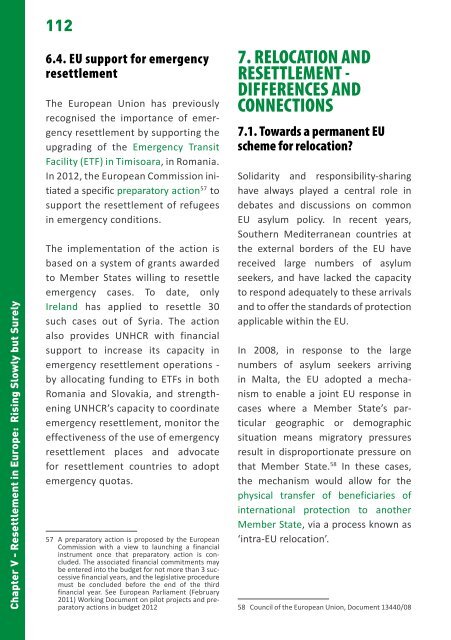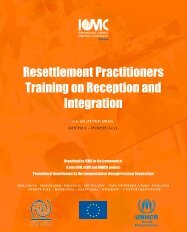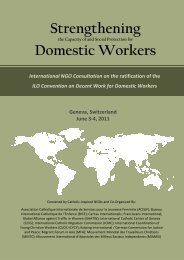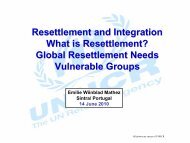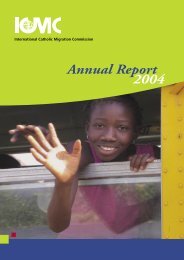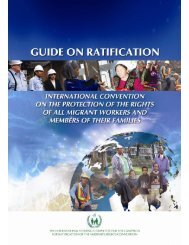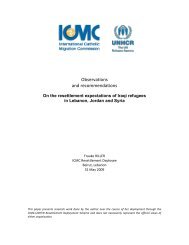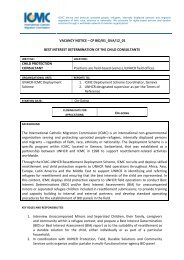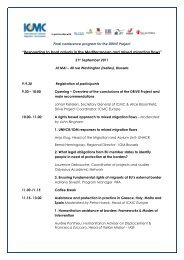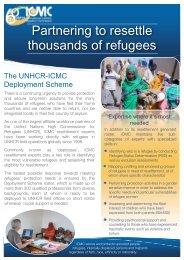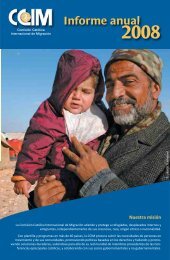ICMCEUROPE WelcometoEurope.pdf (5.89 MB)
ICMCEUROPE WelcometoEurope.pdf (5.89 MB)
ICMCEUROPE WelcometoEurope.pdf (5.89 MB)
Create successful ePaper yourself
Turn your PDF publications into a flip-book with our unique Google optimized e-Paper software.
Chapter V - Resettlement in Europe: Rising Slowly but Surely<br />
112<br />
6.4. EU support for emergency<br />
resettlement<br />
The European Union has previously<br />
recognised the importance of emergency<br />
resettlement by supporting the<br />
upgrading of the Emergency Transit<br />
Facility (ETF) in Timisoara, in Romania.<br />
In 2012, the European Commission initiated<br />
a specific preparatory action 57 to<br />
support the resettlement of refugees<br />
in emergency conditions.<br />
The implementation of the action is<br />
based on a system of grants awarded<br />
to Member States willing to resettle<br />
emergency cases. To date, only<br />
Ireland has applied to resettle 30<br />
such cases out of Syria. The action<br />
also provides UNHCR with financial<br />
support to increase its capacity in<br />
emergency resettlement operations -<br />
by allocating funding to ETFs in both<br />
Romania and Slovakia, and strengthening<br />
UNHCR’s capacity to coordinate<br />
emergency resettlement, monitor the<br />
effectiveness of the use of emergency<br />
resettlement places and advocate<br />
for resettlement countries to adopt<br />
emergency quotas.<br />
57 A preparatory action is proposed by the European<br />
Commission with a view to launching a financial<br />
instrument once that preparatory action is concluded.<br />
The associated financial commitments may<br />
be entered into the budget for not more than 3 successive<br />
financial years, and the legislative procedure<br />
must be concluded before the end of the third<br />
financial year. See European Parliament (February<br />
2011) Working Document on pilot projects and preparatory<br />
actions in budget 2012<br />
7. RELOCATION AND<br />
RESETTLEMENT -<br />
DIFFERENCES AND<br />
CONNECTIONS<br />
7.1. Towards a permanent EU<br />
scheme for relocation?<br />
Solidarity and responsibility-sharing<br />
have always played a central role in<br />
debates and discussions on common<br />
EU asylum policy. In recent years,<br />
Southern Mediterranean countries at<br />
the external borders of the EU have<br />
received large numbers of asylum<br />
seekers, and have lacked the capacity<br />
to respond adequately to these arrivals<br />
and to offer the standards of protection<br />
applicable within the EU.<br />
In 2008, in response to the large<br />
numbers of asylum seekers arriving<br />
in Malta, the EU adopted a mechanism<br />
to enable a joint EU response in<br />
cases where a Member State’s particular<br />
geographic or demographic<br />
situation means migratory pressures<br />
result in disproportionate pressure on<br />
that Member State. 58 In these cases,<br />
the mechanism would allow for the<br />
physical transfer of beneficiaries of<br />
international protection to another<br />
Member State, via a process known as<br />
‘intra-EU relocation’.<br />
58 Council of the European Union, Document 13440/08


